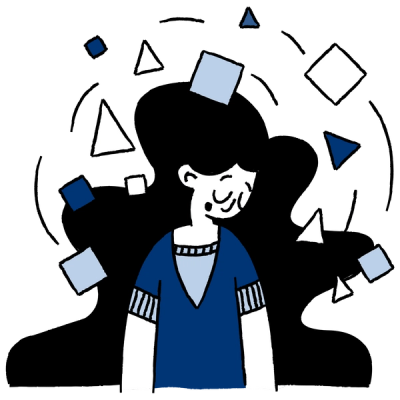What to expect in your first therapy session
You might feel unsure and maybe a bit anxious heading into therapy for the first time, and that’s totally normal.
Your first session is about setting a good foundation. It's an opportunity to learn more about what you can achieve and how the process works.
Most importantly, you can start to evaluate how you feel with your chosen therapist. It’s also a great time to ask lots of questions, which we’ll cover below.
At the beginning of your first therapy session, your therapist may walk you through a few more details, such as the types of therapy they practise and how to book future sessions.
Your therapist will want to understand more about you and how they can help. So be prepared for some questions, such as:
- Why you came to therapy
- What you want to achieve
- If you've attended therapy before
- What's happening in your life
Through all of this, your therapist will probably be taking notes. This might take some getting used to, but it's important so your therapist can refer back to your answers at a later date.
While it’s valuable to be open and transparent with your therapist, remember, you don’t have to share anything you don’t feel comfortable sharing. It’s ok to go at your own pace.
Get to know your therapist
Just as it's important for your therapist to get to know you, it's equally important that you feel comfortable working with them. You can ask them questions about their approach, the therapy process and anything else you like.
- You may want to know
- How therapy works
- When should you expect to see some results
- How often should you meet with them
- What techniques will be used in your therapy sessions
- What will a typical therapy session look like
- How long will therapy last
- How to prepare for sessions
- Is therapy offered in person or online
- Can they help you achieve your goals.
Take note of how it feels to have a conversation with them. Are they paying attention? Are they empathetic? Do you feel comfortable around them?
You might find certain emotions come bubbling to the surface. They could be positive - a sense of relief and comfort. But sometimes challenging feelings might also arise - like sadness or anger.
Therapy is a unique environment, and if it's your first time, talking openly about yourself and your situation can lead to releasing repressed feelings. This is perfectly normal, and you shouldn't feel embarrassed or worried about it.
Instead, pat yourself on the back and congratulate yourself for taking a positive step towards feeling better.
“It felt so good to talk about my feelings, and not have to worry about what the other person was thinking. And the fact they were here for support. ”
What happens after your first session?
As the session comes to an end, your therapist will likely review what you've covered and offer some initial thoughts on the plan moving forward. This might involve actionable next steps, techniques and strategies you can use, or it might involve spending more time understanding your issues - it really depends.
It’s also a great time for you to ask any other questions you might have. Make sure this is realistic - it's important that you feel your goals are achievable.
Don’t worry if you leave your first session with more questions than you came with. You can write down your questions and bring them up in your next session if you decide you want to continue seeing the same therapist.
It might be clear from this first session whether you see yourself forming a good relationship with your therapist.
Other times, you might feel like you’re not getting along with your therapist. If you leave the first session feeling this way, don’t give up.
Finding the right therapist can take time, but it can be life-changing when you do.
Attending therapy isn't a quick fix, but by going to your first appointment, you're making an important step. Just as you won’t learn how to play an instrument or speak a new language after one class, therapy takes time, so it’s important not to drop out after one session. Being unhappy with your haircut probably didn’t stop you from getting your hair cut again and visiting other hairdressers. Instead, you probably tried a few different hairdressers until you found the right one for you.
When things get tough, or you feel like you're not getting enough value from therapy, it might be tempting to call it quits. But the best thing you can do is talk with your therapist about your concerns and what’s not working for you in sessions, and your relationship with them.
Remember, the more information they have, the better they can help you. By being honest about your experience, you open up possibilities for solutions and together, you can find a way forward that makes you feel good.
Discussing any hurdles or problems you’re having with therapy helps keep you moving in the right direction and helps ensure that you don’t end therapy too soon, and for the wrong reasons.







